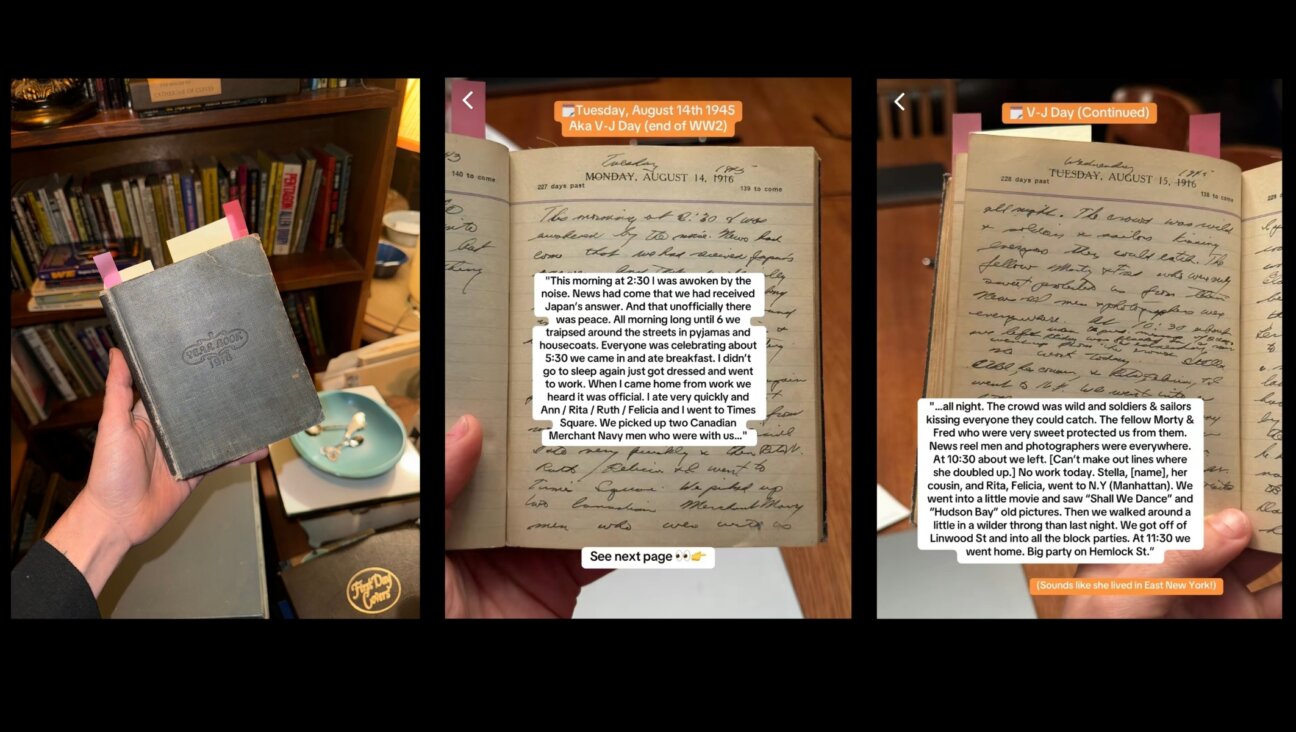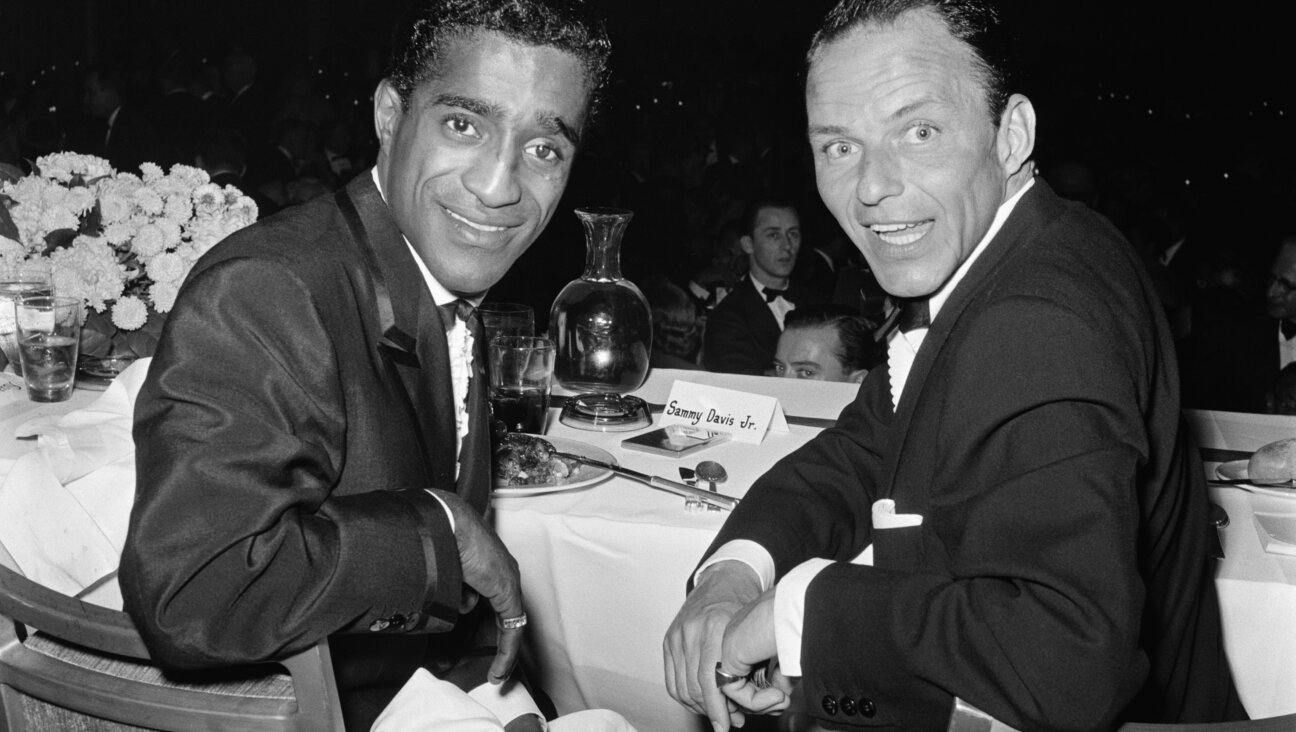JVP: Reactions To Our Parade Protest Were ‘Cruel,’ ‘Homophobic,’ and ‘Hyperbolic’

Image by Courtesy Alissa Wise
The role of direct action in movements for justice has always been to agitate and provoke, to dramatize urgent issues and invite people to take a side.
In fact, that was precisely our goal in organizing the waves of disruptions this past Sunday at the Celebrate Israel parade in New York City, the day before the Israeli occupation of the Palestinian territories turned 50 years old, and in the midst of ever-escalating violence against Palestinians: to dramatize the moral crisis in the Jewish community over its overwhelming, if flailing, support for Israeli apartheid.
It’s not that we didn’t anticipate a hostile response — of course we did. But the backlash we are currently witnessing took even me, someone who who regularly receives hate mail and occasionally death threats, by surprise.
But before we get to the backlash, I want to dwell in the moment of the actions. For those who have never put their bodies on the line in the way direct action demands, let me tell you: when you do it, you do it from a place of love. You do it from a place of hope. You take up space to make room for others to do the same. You do it because violence has been normalized, and you know the status quo will not change unless you bring that violence to the public square.
As a queer-identified rabbi, direct actions have long been a powerful way for me to demand and claim space for myself and other queer and non-zionist Jews in a community that uses its resources and influence to shut down critique of Israel and organizing toward justice for Palestinians. In fact, I first “came out” to my family as both queer and non-zionist when I protested in this very parade in 2002 with my comrades at Jews Against the Occupation.
I was, and remain, intensely proud and moved that so many brave Jews were willing to come to that parade and cause a ruckus. The actions were beautiful and messy, but rooted in a vision of freedom and justice that we breath into being in these small and big, scary and simple ways. Sunday’s action was part of a legacy of such bold action: from Selma, to Stonewall, to Soweto to Standing Rock.
So, the backlash that followed stung all the more deeply. The responses were opportunistically cruel, themselves relying on tired, homophobic memes, and were hyperbolic in the extreme. Some went so far as to claim that the protesters, a group of queer and trans Jews who held their message peacefully while parade-goers charged them (see this video, for example), were guilty of a homophobic hate crime.
The small kernel of truth beneath the mountain of misrepresentation is that one of the six actions that day targeted the LGBTQ contingent, and one segment of the LGBT contingent that the protesters disrupted included Orthodox youth who are newly finding their voice and their place in the Jewish community as out, queer Jews. The contingent also included groups such as A Wider Bridge, notorious for engaging in pinkwashing: using LGBTQ Jewish Israelis to hide and even justify Israeli oppression of Palestinian people, including LGBTQ Palestinians. Suggesting that JVP planned its action to target the Orthodox youth group in particular is both outrageous and egregious. The only explanation for doing so is to smear JVP and divert attention from the substance of the message the protesters carried: “No Pride in Apartheid” and “Queer Jews for a Free Palestine.” To be absolutely clear: JVPers did not target vulnerable youth; they targeted a jingoistic, nationalist parade to defend and celebrate a state that denies equal rights for all its citizens, brutally controls Palestinian life and land and fits the international definition of an apartheid state.
Yesterday, the 50th year to the day of the Israeli occupation of the West Bank, Gaza, and East Jerusalem, the JVP staff began our weekly staff meeting by asking each other to answer a simple yet difficult question: “Why is the Israeli occupation still ongoing?” The discussion that followed was profound, particularly in the wake of the backlash from our actions. Reflecting on the words of the Rev. Dr. Martin Luther King, Jr., the answer that emerged for me was not Donald Trump or Netanyahu. It was the moderates in the Jewish community.
As Dr. King famously wrote from his Birmingham jail cell: “I must confess that over the last few years I have been gravely disappointed with the white moderate. I have almost reached the regrettable conclusion that the Negro’s great stumbling block in the stride toward freedom is not the White Citizen’s Council-er or the Ku Klux Klanner, but the white moderate who is more devoted to “order” than to justice; who prefers a negative peace which is the absence of tension to a positive peace which is the presence of justice; who constantly says “I agree with you in the goal you seek, but I can’t agree with your methods of direct action;” who paternalistically feels he can set the timetable for another man’s freedom; who lives by the myth of time and who constantly advises the Negro to wait until a “more convenient season.”
Rev. Martin Luther King, Jr., 16 April 1963
I have grown used to sitting with a feeling of shame and sadness about the state of the American Jewish community. Today, that feeling is compounded as the knee-jerk response from many in the LGBT Jewish world, the liberal Jewish world and beyond to JVP’s actions at the Celebrate Israel parade is to distort, smear and defame JVP’s tactics, rather than to ask: how are we complicit in the oppression of Palestinians? And what should we be doing to stop it?
A message from our Publisher & CEO Rachel Fishman Feddersen

I hope you appreciated this article. Before you go, I’d like to ask you to please support the Forward’s award-winning, nonprofit journalism during this critical time.
We’ve set a goal to raise $260,000 by December 31. That’s an ambitious goal, but one that will give us the resources we need to invest in the high quality news, opinion, analysis and cultural coverage that isn’t available anywhere else.
If you feel inspired to make an impact, now is the time to give something back. Join us as a member at your most generous level.
— Rachel Fishman Feddersen, Publisher and CEO
























